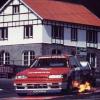Compression Test
Announcements
-
Similar Content
-
Latest Posts
-
Yep, there's a very minor drift left that happens a few seconds after letting go of the steering wheel, but not enough to bother me. Enjoying the car still!
-
I see you've never had to push start your own car... You could save some weight right now...
-
You need to put location and price
-
By Murray_Calavera · Posted
Sounds good. I don't 100% understand what your getting at here. When you say, "I keep seeing YouTube videos where people have new paint and primer land on the old clearcoat that isn't even dulled down" do you mean this - there is a panel with factory paint, without any prep work, they paint the entire panel with primer, then colour then clear? If that's what you mean, sure it will "stick" for a year, 2 years, maybe 3 years? Who knows. But at some stage it will flake off and when it does it's going to come off in huge chunks and look horrific. Of course read your technical data sheet for your paint, but generally speaking, you can apply primer to a scuffed/prepped clear coat. Generally speaking, I wouldn't do this. I would scuff/prep the clear and then lay colour then clear. Adding the primer to these steps just adds cost and time. It will stick to the clear coat provided it has been appropriately scuffed/prepped first. When you say, "but the new paint is landing on the old clearcoat" I am imagining someone not masking up the car and just letting overspray go wherever it wants. Surely this isn't what you mean? So I'll assume the following scenario - there is a small scratch. The person manages to somehow fill the scratch and now has a perfectly flat surface. They then spray colour and clear over this small masked off section of the car. Is this what you mean? If this is the case, yes the new paint will eventually flake off in X number of years time. The easy solution is to scuff/prep all of the paint that hasn't been masked off in the repair area then lay the paint. So you want to prep the surface, lay primer, then lay filler, then lay primer, then colour, then clear? Life seems so much simpler if you prep, fill, primer, colour then clear. There are very few reasons to go to bare metal. Chasing rust is a good example of why you'd go to bare metal. A simple dent, there is no way in hell I'm going to bare metal for that repair. I've got enough on my plate without creating extra work for myself lol.
-







Recommended Posts
Create an account or sign in to comment
You need to be a member in order to leave a comment
Create an account
Sign up for a new account in our community. It's easy!
Register a new accountSign in
Already have an account? Sign in here.
Sign In Now